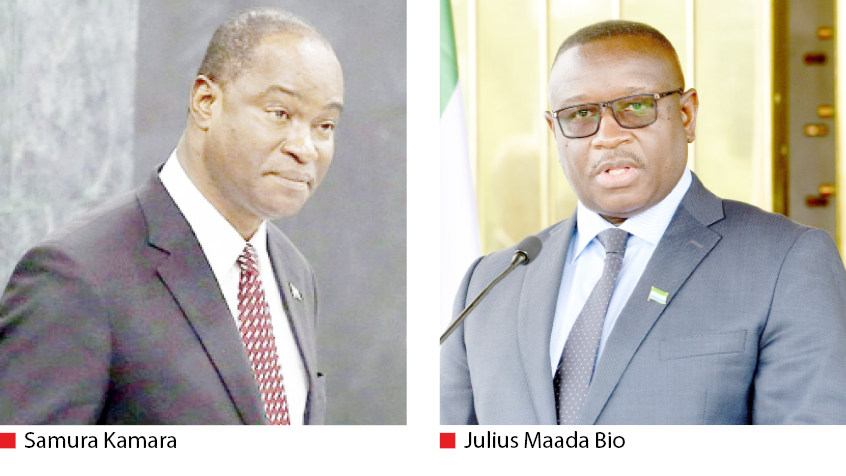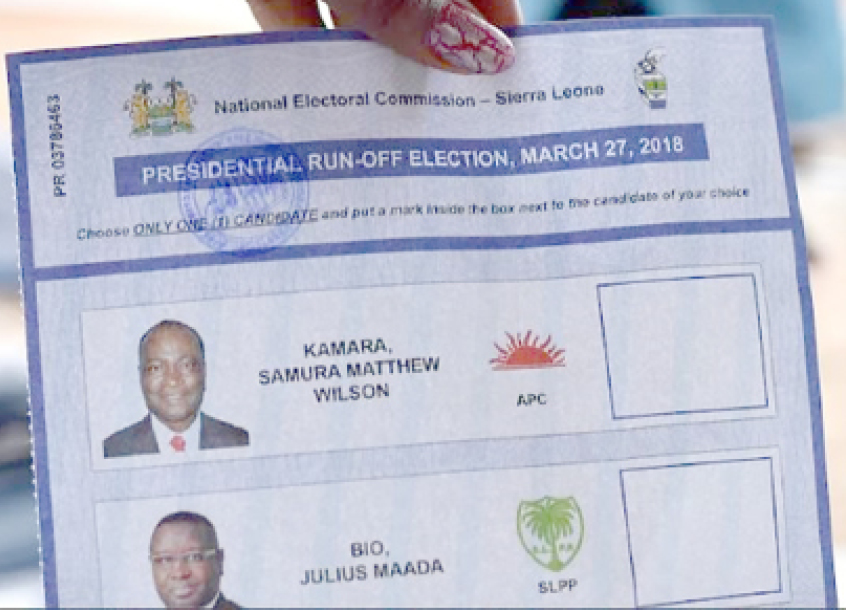APC, SLPP faceoff in Sierra Leone elections: Issues or sentiments?
Six months ago, a brawl erupted in Sierra Leone’s legislative chamber, where members of parliament, mainly from the ruling…

Six months ago, a brawl erupted in Sierra Leone’s legislative chamber, where members of parliament, mainly from the ruling Sierra Leone People’s Party (SLPP) and the leading opposition, All People’s Congress (APC), were seen in a viral video throwing punches and chairs at each other during a debate session over the country’s 2022 public elections amendment bill.
The squabble was over a provision proposing the adoption of a proportional representation system that would see the electoral umpire allocate seats to the names submitted to them by political parties in order of preference or merit.
This provision, among other issues, such as economic difficulties amplified by inflation and unemployment and ethnic considerations will, among other factors, determine the conduct and outcome of the fifth multi-tier elections in Sierra Leone since the 10-year civil war that ravaged the country ended in 2002.
Citizens who are eligible to decide who would be the country’s president are 3.3million out of 8.4 million Sierra Leoneans, as well as 135 members of parliament, 14 paramount chief members of parliament and councillors in the multi-tier elections.
Top contenders
The incumbent president, Julius Maada Bio of the SLPP, hopes to secure victory for a second term against the major contender, Samura Kamara of the APC and 11 other candidates.

Julius Maada Bio
Bio, a retired brigadier in the Sierra Leonean army, came to limelight after the 1996 military junta in the country when he became head of state between January and March 1996.
He returned Sierra Leone to a democratically elected government when he handed power to Ahmad Tejan Kabbah of the SLPP following the latter’s victory in the 1996 presidential election.
After the transition of the country to a civilian government, Bio was granted asylum in the United States, where he lived until his return to Sierra Leone in 2005.
Before his victory at the 2018 presidential election he had contested under the SLPP against former President Ernest Bai Koroma in 2012 and got 37 per cent of the votes, while the incumbent got 58 per cent.
Bio defeated the preferred candidate of his predecessor, Samura Kamara of the APC in the runoff vote of the presidential election with 51.8 per cent of the votes to Kamara’s 48.2 per cent.
He was a cadet graduate from Sierra Leone’s Benguema Military Academy and a master’s degree holder in international affairs from American University in Washington D.C. He is married to Fatima, a Muslim.
Samura Kamara
He was the governor of the Bank of Sierra Leone between 2007 and 2009 and financial secretary in the Ministry of Finance during the Ahmad Tejan Kabbah’s administration. He was also a Minister of Finance and Economic Development from 2009 to 2013
Kamara was a Minister of Foreign Affairs and International Cooperation of Sierra Leone under President Ernest Bai Koroma between 2012 and 2017.
Before joining politics, Kamara had a successful banking career. In 1994, he was appointed a programme manager by the World Bank for its Structural Support Programme to the country.
He also served as financial secretary during this time, as part of efforts to build trust in the management of the mainly international donor flows, which constituted over three quarters of the government’s non- military financial receipts.
He became the secretary of state, finance in January 1996 after Julius Maada Bio overthrew Valentine Strasser.
A commission of inquiry set up in 2018 by President Bio to investigate the APC-led administration of his predecessor, Ernest Bai Koroma, indicted over 300 senior officials of the administration, including Samura Kamara, an outcome that remains controversial.
The determinants
Regional/ethnic politics
Sierra Leone is a secular country, with the constitution providing for the separation of state and religion and freedom of conscience. Muslims make up about three-quarter of the population, though with an influential Christian minority. Religious tolerance in the West African country is considered to be very high.
However, the country is sharply divided along ethnic and regional lines.
About 18 ethnic groups inhabit Sierra Leone. The two largest and most influential ones are the Temne and Mende people, with about 2 per cent of the country’s population being Creole, descendants of freed African-American and Afro-Caribbean slaves.
Divided into five administrative regions, which are subdivided into 16 districts, the political landscape for the presidential election in Sierra Leone is divided between the APC-dominated North and the SLPP dominated South, where each of the presidential candidates come from.
An election observer monitoring the elections in Sierra Leone, Austin Aigbe, who featured on Trust TV’s Africa Update, said although the block votes of each of the top two candidates were expected to come from their regions, the electoral law requires the winner to get a minimum of 50 per cent of the votes.
“There’s a sharp division in the population between the North and South. It is very clear when you have conversation with the people in the country,” Austin said.
He explained that people’s perception about the electoral umpire was based on their regional background, and by extension, party affiliation.
“If you speak to someone who has affiliation with the APC, you are going to see sentiments very strongly. If you speak to someone who has affiliation with the SLPP, you are going to see that perception.
“The people who want to vote for these candidates don’t care whether they have done well or not once they have their ethnic allegiance. They just pursue it. That is a major thing I have seen in this election,” he said.
Economic difficulties
Sierra Leone’s gross domestic product growth for 2022 has been revised downwards to nearly 3 per cent, marking a reversal of the encouraging rebound observed in 2021 when it grew by 4.1 per cent following a 2 per cent contraction in 2020.
Headline inflation averaged 27 per cent in 2022, compared to 12 per cent the previous year. Despite a decrease in global food and fuel prices, inflation worsened due to the depreciation of the Leone (60% during 2022) and loose fiscal policies.
According to the World Bank, “Fiscal pressures have progressively intensified, the debt burden has worsened and inflation has soared, driven by global supply shocks, exchange rate depreciation and deterioration in terms of trade, in addition to internal imbalances.
“The rise in cost of living, combined with weak growth and a decline in macroeconomic fundamentals, threatens to increase the level of poverty within a context of inadequate social safety nets.”
Observers said this would form the basis of the decision for some Sierra Leoneans in the election.
Austin said, “Sierra Leone is impacted by high exchange rates. For example, a dollar now costs 2,000Leone”
“Prices of goods are really high in Sierra Leone. A bottle of Cock is about 10-18Leone, an equivalent of N1,000,”he added.
The proportional representation system
A thorny issue in the buildup to the election is the adoption of the proportional representation system in the country’s recent electoral law, a provision that has been rejected by the opposition.
How it works
Political parties submit lists of candidates contesting for Members of Parliament.
After collating the entire results for the particular area/block, the electoral body will allocate seats to the names submitted to them by order of preference or merit.
It is a system of voting being used in 81 countries of the world and was used in Sierra Leone in 2002 and 1996. However, a recent poll by Meraki Analytics SL Limited indicated that 64 per cent of the electorates are unaware of the PR system or that the parliamentary or council’s election will be held alongside the presidential election.
Speaking on the PR system, Austin argued that although it is not new to Sierra Leone, what is new is the district block system in which “voters will not see the name of the candidates on the ballot” but will see the party on the ballot; hence they are voting for the party.
“The electoral commission has said that they have mobilised civil society organisations to do some form of awareness campaign,” Austin said.
A former Minister of Information, Dr Spencer Bio, in a debate on the system said, “The PR System is a better option to the constituency-based electoral system because it creates room for unity among the electorates and eradicates or drastically minimizes electoral violence that is always part of our elections.”
He believes the system would help to promote inclusive governance and discourage the culture, or better still, the philosophy of “Winner wakes it all,” which is evident in the constituency-based electoral system.
On the contrary, members of the opposition argue that while it is within the prerogative of the president to declare the use of the PR system in consultation with the electoral body, the administration has failed to meet the conditions for the adoption of the system as provided in section 38 of the constitution.
Conclusion
While Sierra Leoneans witness another round of elections, calls by international observers for a peaceful electoral process have been amplified.
Sierra Leoneans are also urged not to allow primordial considerations to becloud their judgements in their choice of those that would lead the country in the next five years.
Stakeholders must also respect the rules of engagement in the process to earn the trust of the population and guarantee peace and stability in the country.
